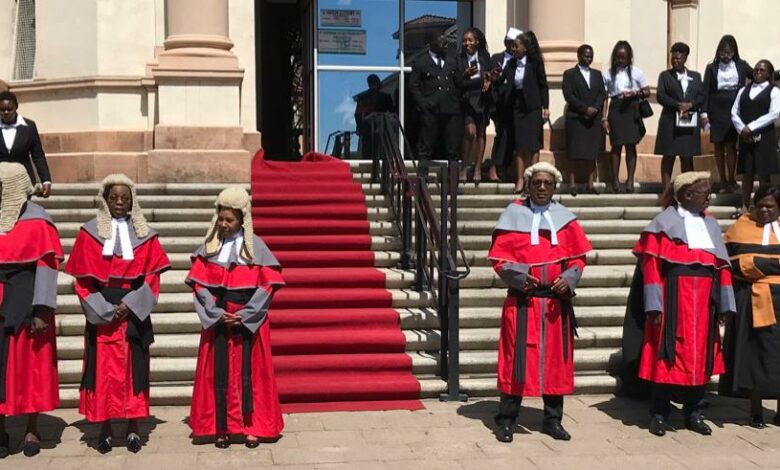JSC condemns unwarranted criticism of judges

The Judicial Services Commission (JSC) has denounced the inappropriate criticism of judges that occurred during the election season last year, claiming insulting and destructive remarks were made about the judiciary in general, as well as some Supreme Court and High Court judges.
Last year, over 100 election petition cases were filed in court, some of which concerned challenges to the acceptance of nomination papers of various candidates in the Nomination Court where some litigants who lost their cases alleged the courts had been captured.
Some of that criticism also came from judicial officers, forcing the JSC to approach the Law Society of Zimbabwe, whose engagement resulted in the amicable resolution of matters.
This was said by Deputy Chief Justice Justice Elizabeth Gwaunza on Monday at the official opening of the legal year 2024 at the Bulawayo High Court, who noted that judges had received unjustified criticism from parties who would have lost cases in court.
Justice Gwaunza lamented that during the course of the elections period last year, “disparaging and damaging remarks were made against the Judiciary in general and some Judges of the Supreme Court and the High Court.”
“The unwarranted aspersions stemmed from decisions which the courts had made. Even more concerning was the fact that the disparaging remarks were made by some members of the legal profession who are expected to have known better,” said the deputy chief justice.
“The JSC engaged the Law Society. The engagement resulted in the matters being resolved amicably.”
Justice Gwaunza said there have been instances where litigants who lost cases went on a tirade, casting aspersions on the integrity of the courts and the Judges.
“They raised unfounded allegations of corruption, threatened, and attempted to intimidate judicial officers who would have made decisions against them. At the last count, seven Judges had fallen victim to the vile misinformation and attempted intimidation,” she said.
Justice Gwaunza said litigants should not use the media to air their grievances as there were court processes if they were unhappy with an outcome.
“The media is an important stakeholder in the dissemination of critical information on the justice delivery system to the public. They have reported on matters of public interest arising from the operations of the courts, including the conduct of judicial officers who are the custodians of the Constitution. The media is encouraged to continue to report fairly on matters of public interest arising from and affecting the justice delivery system,” she said.
Justice Gwaunza emphasised the importance of constitutionalism, saying that it discourages “vexatious and unrelenting litigation” by litigants whose conduct is aimed at undermining public confidence in the independence and integrity of not only the judiciary but the entire administration of the justice system.
“The respect for the rule of law and for the independence of the courts demanded by constitutionalism requires that litigants should comply with court orders and legitimately use the remedies put in place by the law to challenge the unfavourable decisions of the courts,” said the deputy chief justice.
“Appeal processes and complaints mechanisms are not intended to be abused by litigants for selfish ends.”
Justice Gwaunza said the designation of appeal courts by the Constitution arose out of a recognition of the fallibility of, and the possibility of error on the part of, judicial officers and the need to put in place effective remedies for correcting such errors.
“Section 164(3) of the Constitution provides that “an order or decision of a court binds the State and all persons and governmental institutions and agencies to which it applies, and must be obeyed by them”.
The deputy chief justice advised judges not to shy away from making decisions on account of baseless complaints and allegations raised against them by vexatious litigants.
“ Justice is not lopsided. It cannot be the norm that justice can only be said to have been done when the disposition is inclined to a particular outcome favoured by a litigant in question,” she said.
“It will be an affront to the doctrine of constitutionalism and the essence of the rule of law if Judges were to allow themselves to be intimidated by errant litigants who lose cases in court. In pursuing the entrenchment of constitutionalism, the Judiciary thus notes that vexatious litigation, unrestrained denigration, threats and spurious complaints against judicial officers have no place in a country controlled by a constitutional order.”
On that note, Justice Gwaunza said the judiciary will continue to dispense justice in terms of the law, “impartially, without fear, favour or prejudice.”
“The comments made herein are not in any way meant to protect courts and Judges from fair scrutiny, comments and criticisms of their judgments and decisions, because such criticism is a central element of a constitutional democracy,” she said.
Constructive criticism of judges aimed at improving court efficiency is encouraged, acknowledged Justice Gwaunza, but only if done with decency and respect.
“The philosophy underpinning judicial constitutionalism is that judicial officers are servants of the Constitution, as the upholding of the values and the principles of the Constitution is a manifestation of the realisation of the demands that the supreme law of the land places on the people. Constitutionalism is realised through mechanisms set by the Constitution itself and is as such an inherent aspect of the compliance with the Constitution,” she said.
Justice Gwaunza also reminded judicial officers to make sure they make decisions expeditiously in accordance with the applicable law and the facts found proved.







The criticism stems from a clear departure of judgments from established conventions, precedents, and internationally accepted fairness. our judiciary should expect more pronounced “attacks” on their work if courts seem to make “shocking” departures that border on political inclination. Judicial capture is not alien to any court in any country, Judicial heads should not fight those who are helping them to preserve their IMAGE, the slide in reputation has far-reaching consequences for the whole system.